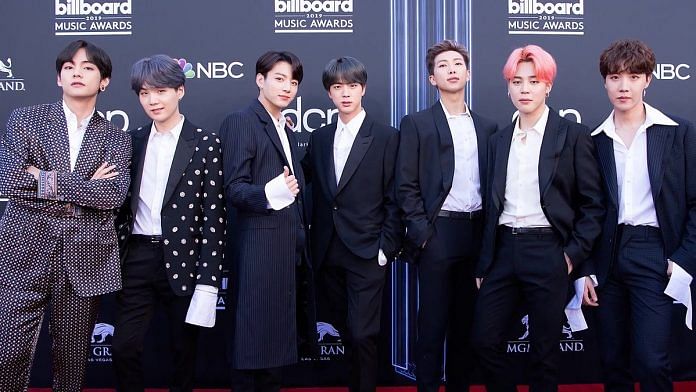BTS is a South Korean boy band that rose to popularity in the late 2010s. Their music is about self–acceptance, self-importance, and self-love. But some of us have been indoctrinated so much by our rigid gender norms that we cannot accept or fully embrace them as they are.
Recently, while scrolling through Instagram, I stumbled upon a reel centred around BTS. The reel was trying to draw attention towards the physical appearance of the band members, noting they looked like ‘girls’. The comments were even worse. Much of the hateful commentary came from boys and men, who labeled the members as girls due to their lack of facial hair and a ‘muscular’ body, and for wearing makeup during on-stage performances. All these comments show how toxic masculinity affects men too. Not just women. The pressure of masculinity is unforgiving on young men in India.
Growing up, many of us have witnessed parents telling boys not to cry with phrases like ‘you’re a boy and boys don’t cry’. As boys grow older and try to express their emotions, society tends to thrust the “be a man” expectation upon them.
Throughout my life, I have seen men pressured by society’s “be a man” jibe — that famous line that Aamir Khan’s character in Dil Chahta Hai uses to goad a hapless Saif Ali Khan. Men are forced to conform to the ideals of traditional masculinity and are shamed if they stray from the path.
From a young age, children are taught that specific behaviours are linked to their gender. Boys are instructed to act tough, cold, strong, and responsible, while girls are encouraged to be gentle, sweet, and attractive.
Toxic masculinity encompasses a range of interrelated norms, beliefs, and practices tied to a detrimental form of masculinity, which harms men, women, children, and society at large. It is a set of societal standards that contribute to behaviours such as hyper-competitiveness, over-reliance on oneself, the glorification of violence, sexism, misogyny, adherence to traditional gender roles, heteronormativity, and, significantly, a heightened sense of entitlement to women’s bodies for sexual pleasure.
Whenever I try to support my male friends going through a hard time and ask them to share their feelings and emotions with me, most are reluctant to open up. A common sentiment among them is, “We boys can’t cry. We have been taught not to cry since childhood.”
Also read: Picture abhi patriarchy hai: Studying Bollywood’s sexism disease
Living the burden
Even Indian cinema plays a huge role in shaping certain behavioural standards for men. Bollywood’s classic trope is to have men look and become superheroes who must save women from the goons, and must beat up half a dozen men single-handedly. This has created unrealistic expectations and traveled to our families too.
The burden of masculinity is heavy on the sons. For example, when a girl wishes to go out in the evening or at night, her brother is frequently asked to accompany her for “protection”. This occurs even if the brother is younger. Even the Delhi police chief Brijesh Gupta had said a decade ago that women should go out at night accompanied by their father or brother. He had said this in 2011, while answering questions about the deteriorating safety conditions for women in the capital city.
It is not the brothers’ job to keep Delhi’s streets safe. It is the job of the government and the police. In the post-2012 Delhi gangrape protests, many young men and women held placards saying precisely this — that the exaggerated notions of masculinity within Indian culture leads men to feel inadequate.
The much-celebrated festival Raksha Bandhan further propagates the idea of brothers being their sisters’ protector. But there’s no festival where girls are asked to protect their brothers simply because they’re male and are perceived as capable of protecting themselves.
Boys and men are always told to suppress their emotions, to be strong. While strength is commendable, these societal pressures lead to negative consequences such as men not seeking help, holding everything in, not acknowledging their problems or denying they exist, which ultimately leaves them suffering alone.
In 2022, a 15-year-old from Delhi Public School, Greater Faridabad, tragically took his own life after facing relentless bullying over his sexuality by other boys in the school.
Such cases are on the rise among the younger generation. During my school years, there were two boys who were always questioned about their sexuality. Other boys used to mock and harass them using words like ‘chakka’, ‘gay’, ‘ladies’.
These two boys were often ridiculed by being called “ladki” (girl) because they had female friends and were closer to female students. Bullies believed that verbally harassing the boys made them appear ‘cool and attractive’.
People think it’s cool to bully men who aren’t physically strong, who express their emotions, or who don’t fit traditional masculine norms.
Men are human beings. They can be emotionally vulnerable and physically weak. They can’t be heroic all the time. They deserve emotional support. It’s human to experience moments of weakness or strength mentally, physically, and emotionally.
Views are personal.
(Edited by Prashant)



